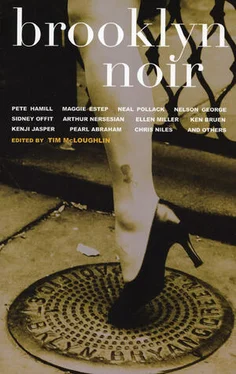“Is that the way it happened, Frank? Exactly that way?”
Frank was smiling at his drink, looking dreamily at his better world. “Who owns memory?” he said.
“Goodnight, Daniel,” Marty said. “It was good of you to stop in.”
I didn’t respond, just turned and slowly walked out. One or two guys gestured at me as I left, the rest seemed not to notice or care.
I removed the picture from my pocket again when I was outside, an action that had taken on a ritualistic feel, like making the sign of the cross. I did not look at it this time, but began tearing it in strips, lengthwise. Then I walked, and bent down at street corners, depositing each strip in a separate sewer along Fourth Avenue.
He’d told me that he’d broken his arm in a car accident, pursuing two black kids who had robbed a jewelry store.
As I released the strips of paper through the sewer gratings, I thought of the hand in the subway tunnel, and my father’s assertion that there were many body parts undoubtedly littering the less frequently traveled parts of the city. Arms, legs, heads, torsos; and perhaps all these bits of photo would find their way into disembodied hands. A dozen or more hands, each gripping a strip of photograph down in the wet slime under the street. Regaining a history, a past, that they lost when they were dismembered, making a connection that I never would.
Practicing
by Ellen Miller
Canarsie
When my father started to bench-press me, I figured he meant business. For real. Finally.
By the time he started bench-pressing me, I’d already wisely given up hope that he’d ever make good on his promise. But the bench-pressing seemed an encouraging sign, enough of a reason to believe my father, so I suspended my doubt.
I didn’t simply hope. I believed
He’d been promising for two years — twenty-five percent of the time I’d spent being alive, being his daughter. Being alive and being his daughter were the same single thing. The only thing and everything. All I wanted from the world.
The first time was supposed to be my sixth birthday present. I bugged him. I nagged him, like a wife. I irritated myself when my talking-out-loud voice would whine — like a child, which I insisted I wasn’t — But you promised , even though my thinking-inside-myself voice had long ago admitted defeat, told me the truth, convincingly and correctly maintaining, Nothing doing. Pretend he never said a word. Forget it. Then, out of the blue, he’d say, “Later, I promise,” and he’d give me a wink. Dad was the only man I’d ever meet who didn’t, upon winking, instantly become a calamitous schmuck. “We have plenty of time.”
The promise itself was a present, a gift he offered not only to me, but also to time, to the future, stored in a box filled with mystery, tension, delay, buildup, all to be revealed later. If his promise had been packaged and wrapped, the gift-card’s envelope, taped seamlessly to the top, would have read, Do Not Open Me Until… but the calligraphy would have stopped short of naming the holiday. He kept me guessing and waiting, waiting, but since I couldn’t tell time, I couldn’t know for how long. Exactly what, at eight years old, did later mean? His words, spoken to the future, “We’ll go later, next month,” didn’t sound a helluva lot different from, “We’ll go later, in fifteen years.” One month. Fifteen years What was later? When did later bleed into too late? How much time was plenty of time? What sensations could be expected when plenty of time elapsed and disappeared? When did too late become never? Time, always warped and subjective, was especially so when I hadn’t been around long enough to develop and practice the rote, unoriginal, possibility-canceling, chance-choking, constricting — that is, adult — habits of experiencing time, living in time, doing time, apprehending in a felt way, without having to concentrate so hard my eye sockets pounded, how long fragments of time were supposed to last until they stopped being fragmentary and became durable, lasting. How long? Long enough. To last. Until. Lasting.
Instead of bringing me up, the day I turned six he brought home a squat glow-in-the-dark clock. An alarm clock. I couldn’t read it; I couldn’t set it. I’d look at its various meaningless appendages — arms, hands, digits — then quickly turn from the pale, sickish, muffled green glow. When I couldn’t sleep, the tick contributed its two cents to my considerable, familiar insomnia and anxiety.
Soon I appreciated the stunning appropriateness of the erm alarm clock
Perhaps he intended to teach me early on — to route my thoughts along an acceptable, suitable course immediately, starting my expectations off right at age six — that clocks were meant to be punched.
His promise, so handsomely packaged in that gift-box, contained nothing, so I’d done good to halt hope in its tracks. To stop hoping for Dad to make good on his word, or for much of anything else, seemed a wise idea, a useful policy to adopt more generally, to apply more globally, as an apotropaic A prophylactic against disappointment. Disappointment was dangerous.
But he started again just before I turned eight. “We’ll have so much fun. Just you wait.” Repetition, and the slippage of much too much time — even I knew by then how long too long , how much was much too much — between the initial promise and its most recent nonfulfillment, emptied the promise-box of all the substance it probably had never had, so I gave him a piece of my mind. “You’re full of bull. You’re just all phony baloney.”
“I’m what?” Mock horror. Mock indignation. Mock mockery.
“I said, Dad, that you are all yak and no shack.” I didn’t know what I meant, but I liked how tough it sounded.
“The things that come out of your mouth.” He snorted. “Where do you get them?” In mock fury, he commanded, “Get your tush over here. Right now, you little… you little… you little you.”
He shook his head gravely, freighting the final pronoun, you with extra volume and vocal emphasis, so that the you by whom he meant me almost sounded like it referred to something special. Like some languages had one you for politely addressing outside-people and another you for informally addressing inside-people; other languages had one you for speaking to superiors and another you for speaking to subordinates; English — rather, my Dad’s peculiar delivery of English — conferred upon me a separate, specific second-person pronoun. It sounded and was spelled the same as other you’ s, but Dad’s you as in, “you little… you,” referred just to My very own second-person pronoun! Now that was one tremendous gift if there ever was one.
But even having my very own personal pronoun was risky, because it’s pretty tough to keep stopped-hope stopped up when you are getting all you ed up, when someone you really like keeps promising you scary, fun, exciting stuff — and even tougher for the of that moment to remain securely devoid of hope, to make smart, self-denying decisions with Dad you ing me — the long ooo of it broad and extended, like a hand.
“Now,” he announced, rubbing his hands together — like a man who’s busted his ass all week, eaten crow at a job he hates, but it’s Friday, and his dinner at Abbracciamento on the Pier, a thick steak pizzaiolo, fatty, bloody meat sizzling, cheese bubbling, is being served by a hot-to-trot miniskirt, he’s salivating, thinking, this is gonna be yummy — “we start practicing.” Before I noticed his swift crouch and downward reach, he’d grabbed my ankles and flipped me, along with the rest of the visible world, upside down. Queasy with suddenness, I tried focusing hard, to keep everything from whirling too wildly, on the paint-splatters everywhere covering his stumble-proof, good-luck work boots. Together, we slid to the floor. I righted myself to sitting too fast; my subadequately upholstered tush — a bony butt without cushioning ocks — banged to the linoleum. “We gotta be prepared,” he declared. “I’m gonna need some big muscles if we’re gonna do this.”
Читать дальше












